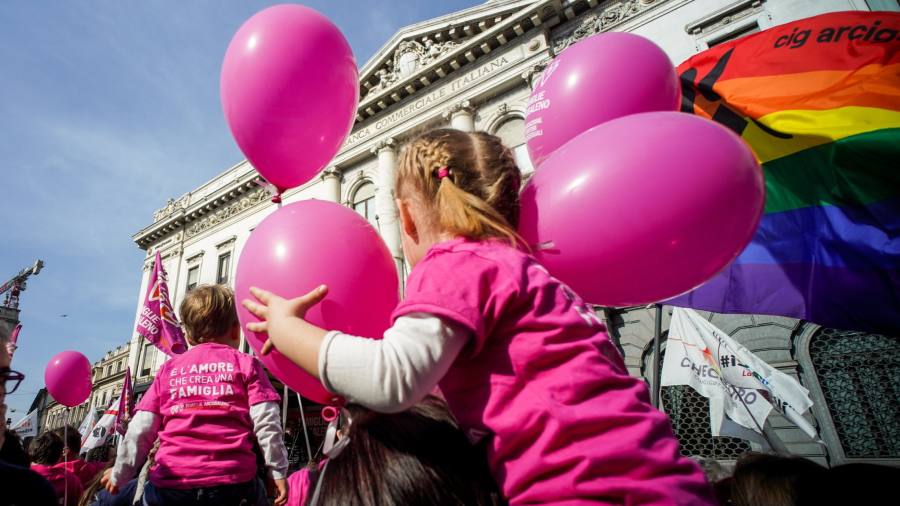Italy’s rightwing governing coalition is moving to ban Italians from having babies through surrogacy abroad, drawing fire from LGBT+ activists who say they are already treated like outlaws for wanting to have children.
Surrogacy — and its promotion — has been illegal in Italy since 2004 and is punishable by up to two years imprisonment and a €600,000 fine, prompting Italians to look for surrogate mothers in other countries.
Angered by what it calls “procreation tourism”, the ruling hard right Brothers of Italy party is now pushing to make it a crime for Italians to have babies through surrogacy even in countries where such arrangements are legal.
“Surrogacy is a degrading practice that affects women who often face economic difficulties,” said Carolina Varchi, the Brothers of Italy lawmaker spearheading the proposal in Parliament. “It is aimed at destroying, by contract, the idea of motherhood — an idea that resides in the laws of nature.”
Varchi argued that Italians increasingly go abroad to circumvent “criminal liability”. “Our goal is to counter this practice,” she said. “If someone decides to violate this law, they know they will be punished when they come to Italy.”
The draft ban — which will increase the fine to €1mn — is backed by prime minister Giorgia Meloni, who has appointed a dedicated minister to try to reverse the country’s relentless decline in new births.
“Maternity is not for sale,” Meloni said at a conference on Italy’s demographic crisis in May. “Wombs cannot be rented out.”
Surrogacy is not the only form of assisted reproduction that Italians pursue abroad. In vitro fertilisation is only legally available to heterosexual married couples, forcing same-sex couples and single women to seek fertility treatment elsewhere.
The drive to further restrict surrogacy has LGBT+ activists up in arms.
“What are they going to do? Tear children from their families, or put parents in jail . . . just because they don’t agree with their choices,” asked Christian De Florio, 47, parent to five-year-old twin boys born to him, and his long-term partner, via a surrogate in the US.
Activists argue that such restrictions would eventually be deemed unconstitutional, but warn that any legal challenge will take years. This is only increasing the level of anxiety, particularly for future parents with surrogate pregnancies already under way.
“People who are expecting babies — who have the pregnancy going on — don’t know what is going to happen when they get to Italy,” said Alessia Crocini, president of Rainbow Families, a gay parents organisation. “A lot of people are very worried and very scared.”
Italy has no data on how many babies are born to its citizens through surrogate mothers each year, though Varchi estimates it is just a few hundred. Married couples typically seek surrogates in nearby Greece, Georgia, Moldova and — before its invasion, Ukraine. Prospective LGBT+ parents usually go to the US or Canada, the only countries where surrogacy is legal for same-sex, non-resident couples.
Though Varchi said the ban would not is not be retroactive or hurt children, the draft law is vague on the fate of new babies born though surrogates, or how Italians arriving in the country with such infants would be prosecuted. “Our goal is to act as a deterrent,” Varchi said. “We want surrogacy to be seen for what it is: an extremely bad thing.”
Crocini called the draft a law political tool to distract public attention from more serious issues, like the government’s difficulties in absorbing EU funds and other economic woes. “It’s propaganda against homosexual rights, civil rights,” she said. “It’s very easy: you forbid something that is already forbidden in Italy.”
Yet the passage of the ban will inevitably stigmatise children born through surrogacy and now growing up in Italy. “You are telling children — Italian children — that they are born from a criminal offence like rape, or a moral offence like incest,” she said.
De Florio and his partner Carlo Tomino, 37, are also concerned for the impact on their sons. “We don’t want to raise our children in a society that sees their parents as thugs and bandits,” De Florio said. Tomino added that “the language some people are using is assuming that our family is a felony, a crime. But our family is a family just like all families.”
Additional reporting by Giuliana Ricozzi in Rome
Read the full article here




